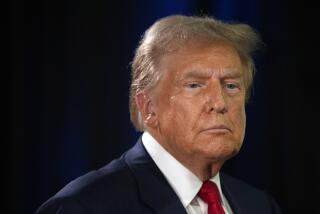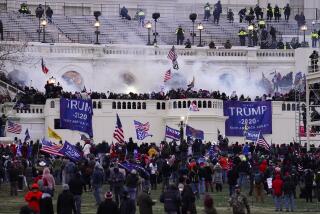Judge Tosses Out Terror Conspiracy Counts Against Lawyer, 2 Others
- Share via
NEW YORK — A federal judge, ruling against the Justice Department in a terrorism case, threw out two conspiracy counts Tuesday against a prominent civil rights lawyer and two other defendants, saying the charges were unconstitutionally vague.
In a 77-page decision, U.S. District Judge John G. Koeltl let stand other charges that attorney Lynne Stewart, a translator and a U.S. Postal Service employee had conspired to defraud the United States, and that Stewart had made false statements.
Stewart had been accused of relaying messages to terrorist groups from her client, Sheik Omar Abdel Rahman. The blind Egyptian cleric is serving a life sentence for conspiring to blow up New York City landmarks and also kill Egyptian President Hosni Mubarak.
Stewart, who has a long history of supporting left-wing political causes, and the other two defendants have pleaded not guilty; their trial is scheduled for early next year.
“I’m relieved and elated,” Stewart said in a brief statement to Associated Press, adding that she would make no further comment until she had read the opinion.
A spokesman for James B. Comey, the U.S. attorney representing the Southern District of New York, said: “We continue to believe that the statute prohibiting material support of terrorism is constitutional and we are reviewing our appellate options.”
The decision was a setback for U.S. Atty. Gen. John Ashcroft, who had announced the indictments against Stewart last year with fanfare, noting that they resulted from a three-year probe of the lawyer’s activity. While Ashcroft said she had crossed the line from advocate to conspirator -- violating a federal law prohibiting people from giving material support to terrorists -- Stewart and others said the indictments were an attack on her 1st Amendment rights and on the attorney-client privilege.
Last year, during an appearance on CBS-TV’s “Late Show with David Letterman,” Ashcroft said: “We simply aren’t going to allow people who are convicted of terrorism to continue ... directing the activity from their prison.”
But Tuesday’s decision appeared to challenge the legality of that strategy, at least in this case. Koeltl sided with Stewart’s attorneys, who argued that a terrorism statute outlawing the use of telephones and other communication devices -- but not specifying what exactly is considered material support -- is unconstitutional.
Stewart, who worked on several cases with the late William Kunstler, has represented a diverse group of radicals and other political defendants during a controversial 27-year career. Last year, in an interview with the Los Angeles Times, she said Sheik Abdel Rahman “is a star, one of those people you meet in this world journey and you know immediately you are in the presence of someone worldly.”
While Americans might view those who carried out the Sept. 11 attacks as terrorists, to their people “they are freedom fighters” opposing dictatorial Arab regimes, she said. “America likes to say, ‘Do it our way,’ but people have to do it their way,” she added. “We are a country founded in violence and so it is used by others to determine their own future.”
Stewart, 63, was in her Brooklyn home on April 9, 2002, when FBI agents put her in handcuffs, charging that the attorney had secretly passed messages from Abdel Rahman to the Islamic Group, an Egyptian-based terrorist organization.
According to the indictments, Stewart and a translator, Mohammed Yousry, would visit Abdel Rahman in prison; while Stewart would allegedly distract guards with discussions in legalese, Yousry would talk about terror and revolution in Arabic. With the aid of Ahmed Abdel Sattar, a postal worker, Abdel Rahman’s comments -- and messages -- would be relayed to followers, the indictments said.
Koeltl indicated that he would hold a hearing within several weeks on the remaining charges against Stewart, Yousry and Sattar.
More to Read
Sign up for Essential California
The most important California stories and recommendations in your inbox every morning.
You may occasionally receive promotional content from the Los Angeles Times.













